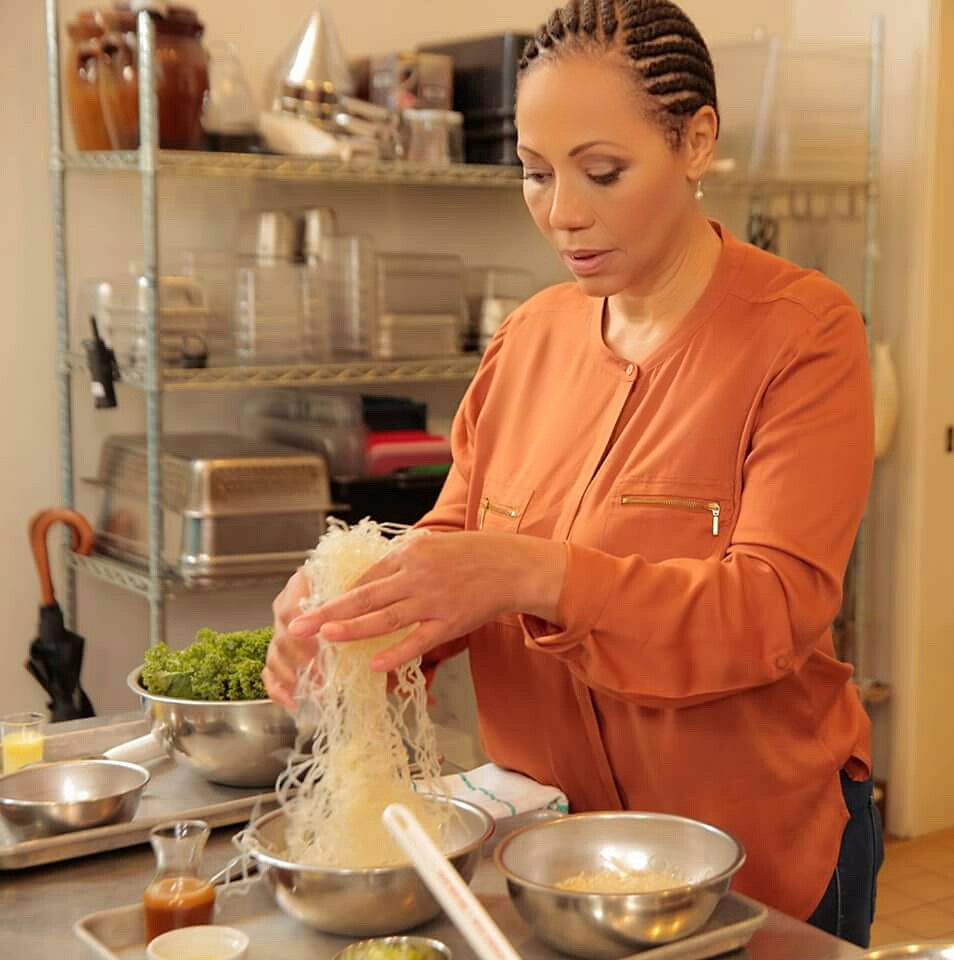
Celebrating International Women’s Day and National Nutrition Month with insights from Chef Nina Curtis
March is full of celebrations. In fact, the entire month is dedicated to improving our nutrition on a national level. The National Nutrition Month campaign focuses on making informed and educated decisions regarding our nutrition, eating habits and food choices. Not only this, but International Women’s Day also falls on March 8th. Established in 1909, International Women’s Day celebrates women’s accomplishments and their rights.
Since these two important celebrations fall within the same month, we at Adventist Health thought: “What better way to celebrate than sharing nutritional insights from our own acclaimed Chef Nina Curtis?” As a highly successful female chef, Curtis has revolutionized the way we think about food and has shared some tips with us in an interview that we are happy to share with you!
1. There are many conflicting studies about which “diet” is labeled the healthiest – in your opinion, what is the best way people can create a balanced, healthful diet?
I think that there is a negative connotation to the term diet in general. We should think of food as nourishment and fuel that creates a support system for our body, mind and spirit. With that said, here’s what we should focus on:
- Whole foods (not processed or minimally processed). We want to ensure that we are consuming nutrient-dense foods, including: macro (high quality, bio-available proteins, essential fatty acids/lipids and complex carbohydrates) and micro (vitamins and minerals) nutrients. Nature provides whole foods as the best “fast foods” – think fruits and veggies.
- Eat foods that are in season. Foods that are in season naturally taste better and are more nutrient-dense, versus foods that are stored in coolers for long periods of time. They are often more affordable as well.
- As much as possible, eat foods that are locally grown. Nothing tastes as good as a tomato picked right off the vine. Shop at your favorite local farmer’s market to support your community farmers, which are often located just miles away from you.
- Traditional foods that are indigenous to our local regions nourished our
 ancestors throughout history. These foods have stood the test of time, offering many healing powers. Fermented, cultured, unrefined, raw and slow-cooked foods continue to keep us well, aiding assimilation and digestion of nutrients.
ancestors throughout history. These foods have stood the test of time, offering many healing powers. Fermented, cultured, unrefined, raw and slow-cooked foods continue to keep us well, aiding assimilation and digestion of nutrients. - Balanced foods. Along with macro and micro nutrients, balanced foods include salty, sour, bitter, sweet and savory flavors to keep the body in peak form.
- Focus on fresh and organic foods without artificial ingredients. Steer clear of foods that have been heavily processed, irradiated or genetically modified. Likewise, your food should be free of chemical additives, colorings and preservatives.
- Delicious. Never sacrifice taste – it’s the joy of life and it keeps us wanting more of a good thing. So many processed foods are overly salted and have hidden processed sugars. Our tastes buds, over time, can become numbed or unable to truly enjoy the natural flavors of whole and fresh foods.
- Drink plenty of fresh, filtered water. Yes, water, the fountain of youth.
2. What are some of your recommendations for those who are making the transition to a healthier lifestyle of eating?
If someone is looking to transition to healthier eating and lifestyle, I always take a look at what’s currently on their plate. What types of foods do they like and what are they eating? Fast foods, processed foods, empty calories, etc.? From there, I begin to “crowd out.” This means that I begin to replace their current eating habits with foods that they like that are also full of nutrients and that taste delicious – sometimes even more delicious than what they thought they liked! I introduce all the foods that I mentioned above and customize a program that is realistic just for the individual, and we keep growing from there.
3. What are some things companies can do to inspire healthier lifestyles among employees?
First and foremost, companies can provide healthier food options in their cafés (for example, Meatless Mondays, full salad bars with pulses and legumes). Companies who want to be health-conscious need to ensure that there are plenty of nutrient-dense foods, while providing and encouraging drinking plenty of filtered water throughout the day (such as “wellness waters” infused with fruits or vegetables are a great treat).
- Provide vending machines full of healthy snacks like fresh fruits, veggie crudités, hummus, healthier packaged snack options (air popped popcorn, popped quinoa, and other popped ancient grains with delicious seasonings and herbs), nuts and seeds.
- Supply associate/staff rooms or pantries filled with healthy snacks and healthy desserts – yes, there is such a thing! Raw vegan cacao brownies are so delicious.
- Include beverage items such as organic coffee, matcha and jasmine teas, herbal tisanes, and sparkling fruit flavored waters.
- Provide areas in the building where employee can take a digital detox. Ten minutes away from all electrical devices, even the cell phone, can be so good for us!
- Set up a motion room where employees can get moving on a treadmill for five minutes or jump on a mini trampoline for three minutes (this does the brain, circulatory and lymphatic system so much good).
- Provide quiet rooms so one can just be still for a moment.
- Plant beautiful gardens inside and out where employees can relax and take time to smell the roses.
4. What inspired you to become a vegan chef?
I love to eat delicious food!
I started cooking with my mom at the age of 8. My dad is a classically trained  chef and worked in catering, so there was always something that needed to be prepped and an extra pair of hands was always appreciated.
chef and worked in catering, so there was always something that needed to be prepped and an extra pair of hands was always appreciated.
In my adult years, I began to compete in natural bodybuilding and my body stopped wanting any form of animal protein, so I had to figure out how to get my protein from plants. I felt better, performed better, won more competitions and my recovery time was faster.
I really dove in and studied plant-based nutrition, learning all the ways to make delicious vegan/plant-based foods that supported my athletic needs. I soon realized when I went out to eat that there were not as many great choices. I always cooked for friends and family, so they had to start eating what I liked to cook – and they loved it! Friends were always asking how they could learn to cook this way. People would comment that they felt better, and less sluggish, after eating my food. I knew it was all the healing benefits of the food I was preparing. I really wanted to cast my net further to help others eat healthier, feel better and love the food that they were eating. I took classes all over the country and traveled to other countries to learn different cuisines. I try to master all that I do, so, two culinary schools later, I am continuing to cook delicious plant-based food for the masses, my family and my friends.
My inspiration continues to be my love for delicious, good-for-me foods!
5. What made you want to join the Adventist Health team? How does their mission align with your personal mission?
I studied about the Blue Zones and the Loma Linda community during my naturopathic and nutritional training, so I was familiar with Seventh-day Adventists and their heritage. Once I was introduced to Adventist Health and the concept for the café and the health center at its new campus, everything felt so aligned with my vision of wellness. I knew I wanted to be a part of this progressive organization.
6. What goals do you hope to accomplish during your time at Adventist Health? What changes do you hope to implement?
I am super excited about the addition of the café at the new Adventist Health Campus in Roseville. I think that we will set the standard for what cafés and restaurants can offer their customers by cooking healthy food without sacrificing taste. As a WELL Building Certified Campus, the café must adhere to high standards. This certification supports One Adventist Health by going above and beyond to provide a wellness environment for all of our associates and campus visitors.
WELL Certified Café Highlights:
Eighty percent of our food offerings will be:

- Organic fruits and vegetables
- Local and sustainable produce
- Nutrient-dense and delicious meals made from scratch
- Naturally sweetened beverages
- Free of heavy processing
- Free of chemical or genetic engineering
- Free from processed sugar
We aspire to set our standards high and make delicious, healthy choices easy for our associates! We also have a teaching kitchen where my team and I will show our associates how to duplicate their favorite meals from the café at home.
7. Besides actively monitoring what we eat, what are other ways we can continue to strive for a healthier lifestyle?
We can create wellness rituals for ourselves that support our individual likes and needs. This may be slightly different for everyone, but I always like to ask what makes you feel delicious? For some, it might be taking a long and relaxing mineral bath at night before bed; for others, it might be sitting in an infrared sauna and sipping an herbal tisane after a long day. Someone else may love a high impact workout followed by a soothing massage. Whatever it is, we should commit to doing it daily, weekly or monthly, but commit nonetheless and be willing to try new things.
How will you commit to being healthier this month? Remember, March is a month that celebrates nutrition and revolutionary women, so take advantage by revolutionizing your eating habits!


